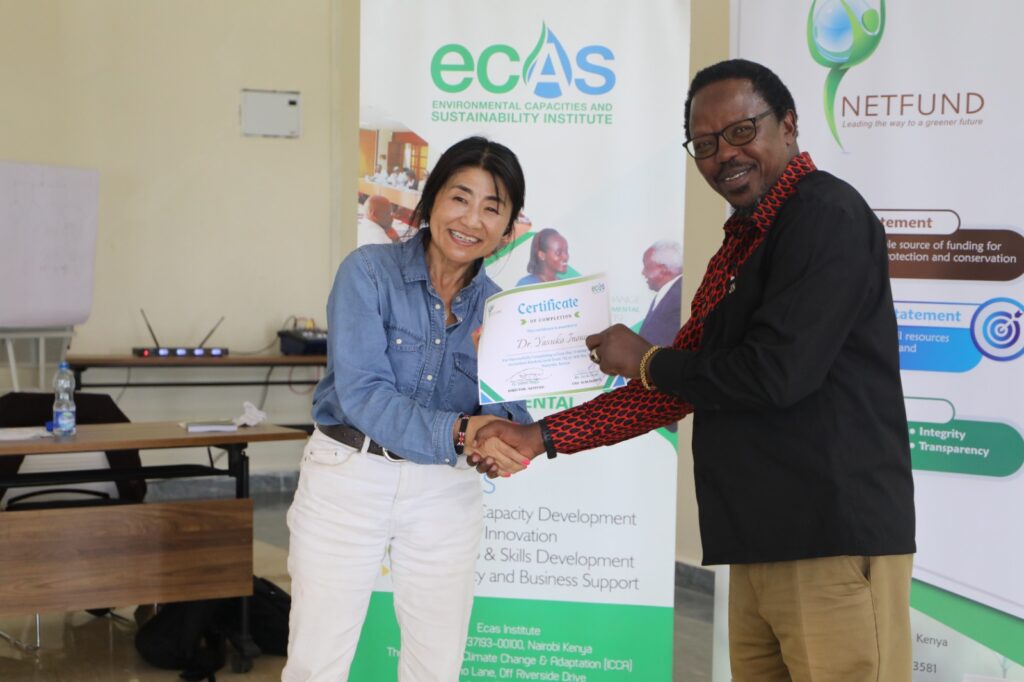
INTERNATIONAL TRAINING ON TENURE SECURITY FOR BETTER FORESTRY: APPLYING THE VOLUNTARY GUIDELINES ON THE RESPONSIBLE GOVERNANCE OF TENURE
COURSE BACKGROUND
Governments and development organizations increasingly understand that stronger land and resource rights, or “tenure security,” are crucial for sustainable forest use. When people have clear, secure rights to forests, they are more likely to protect and manage them for the long term. Without this security, forests often suffer, impacting global climate goals and sustainable development.
ECAS Institute recognizes that secure tenure is a powerful incentive for responsible forestry. This course will help learners understand and apply the Voluntary Guidelines on the Responsible Governance of Tenure (VGGT), a key global framework. Our aim is to build capacity in strengthening tenure, aligning with our mission to promote sustainable natural resource management.
This training is designed to equip participants with principles for applying the VGGT to improve forest tenure. It will cover how tenure issues affect forests, core VGGT concepts, assessment methods, and best practices. By focusing on practical application, ECAS aims to foster more secure and sustainable forest management worldwide.
COURSE OBJECTIVES OF THE TRAINING
Upon completion of this training, participants will be able to:
- Explain national and global forest challenges and their connections to underlying tenure issues.
- Understand tenure concepts and the principles of the Voluntary Guidelines on the Responsible Governance of Tenure to Land, Fisheries and Forests (the VGGT).
- Describe how the application of the VGGT can strengthen the forestry sector, particularly non-state forestry, and identify some methods for improving data quality.
- Learn how to conduct forest tenure and governance assessments.
- Find additional resources on forest tenure and the VGGT.
WHAT YOU WILL LEARN
This course is designed to help learners understand and apply key principles for strengthening tenure, based on the Voluntary Guidelines on the Responsible Governance of Tenure of Land, Fisheries and Forests (the VGGT) principles. You will learn:
- National and global forest challenges and their connections to underlying tenure issues.
- Tenure concepts and the principles of the Voluntary Guidelines on the Responsible Governance of Tenure to Land, Fisheries and Forests (the VGGT).
- How the application of the VGGT can strengthen the forestry sector, particularly non-state forestry. Some methods for improving data quality.
- How to conduct forest tenure and governance assessments.
- Find additional resources on forest tenure and the VGGT.
DURATION AND PROGRAM
This is a structured training course, consisting of 4 lessons, the program is designed to help learners understand and apply key principles for strengthening tenure. The detailed program schedule, including specific session timings and opportunities for interactive discussions, will be communicated prior to the training commencement.
TARGET PARTICIPANTS
This course targets a wide range of stakeholders, specifically:
- National land and forest policy makers and technical advisors.
- Forestry practitioners and programme managers.
- Non-governmental organizations and civil society organizations.
- Forest user groups and producer organizations.
- Private sector companies working in the forestry sector.
- Forestry academics and students.
TRAINING MODULES
The course consists of 4 focused lessons, providing a comprehensive overview of tenure security in forestry through the lens of the VGGT:
| No | Module | Details | |
| 1. | Secure Forest Tenure is the Foundation for Achieving Global Goals |
This module introduces the critical link between secure forest tenure and the achievement of broader global goals like sustainable development and climate action, exploring underlying tenure issues that affect forest health.
|
|
| 2. | The VGGT and Their Importance in Forestry |
This module delves into the core concepts of tenure and introduces the principles of the Voluntary Guidelines on the Responsible Governance of Tenure of Land, Fisheries and Forests (the VGGT).
|
|
| 3. | Assessing Tenure Using the VGGT |
This module provides practical guidance on how to conduct assessments of forest tenure and governance, utilizing the VGGT principles as a framework.
|
|
| 4. | VGGT Best Practices |
This module showcases successful applications of the VGGT principles in diverse forestry settings, highlighting best practices and providing resources for further learning.
|
|
TRAINING STYLE
The modules will be taught through PowerPoint presentations, and lectures and will include a case study/field visit, breakout sessions, case studies and other interactive discussion components.
The course will also include a few guest speakers, both in person and via Zoom and other online learning platforms for overseas speakers. This provides useful real-world insights alongside the more theoretical aspects of the course.
The conference faculty shall consist of experienced decision makers, as well as practitioners and representatives from established educational and research institutions active around climate change, engineering and international development. Throughout the course, theoretical presentation of concepts will be moderated and more group discussions and plenary engagements will be optimized. PowerPoint presentations will be made by facilitators and resource persons, to highlight key concepts before embarking on group work.
GENERAL NOTES
- Training manuals and additional reference materials are provided to the participants.
- Upon successful completion of this course, participants will be issued with a certificate.
- We can also do this as a tailor-made course to meet organization-wide needs. Contact us to find out more: info@ecasiafrica.org.
- Payment should be sent to our bank account before the start of training and proof of payment sent to: info@ecasiafrica.org.
ABOUT ECAS INSTITUTE
The ECAS Institute designs and delivers independent and targeted training, research, and consulting services. Our work focusses on climate change and resilience building, carbon markets, renewable energy, nature-based solution, biodiversity conservation, agriculture and food systems, We are located in Nairobi Kenya and work across the African region. We have implemented training and research assignments in Kenya, Tanzania, Uganda, South Sudan, Somalia, Malawi, Rwanda, Congo, and South Africa. Globally, we have supported our partners from the UK, Denmark, Italy, Sweden, Germany, and USA.

